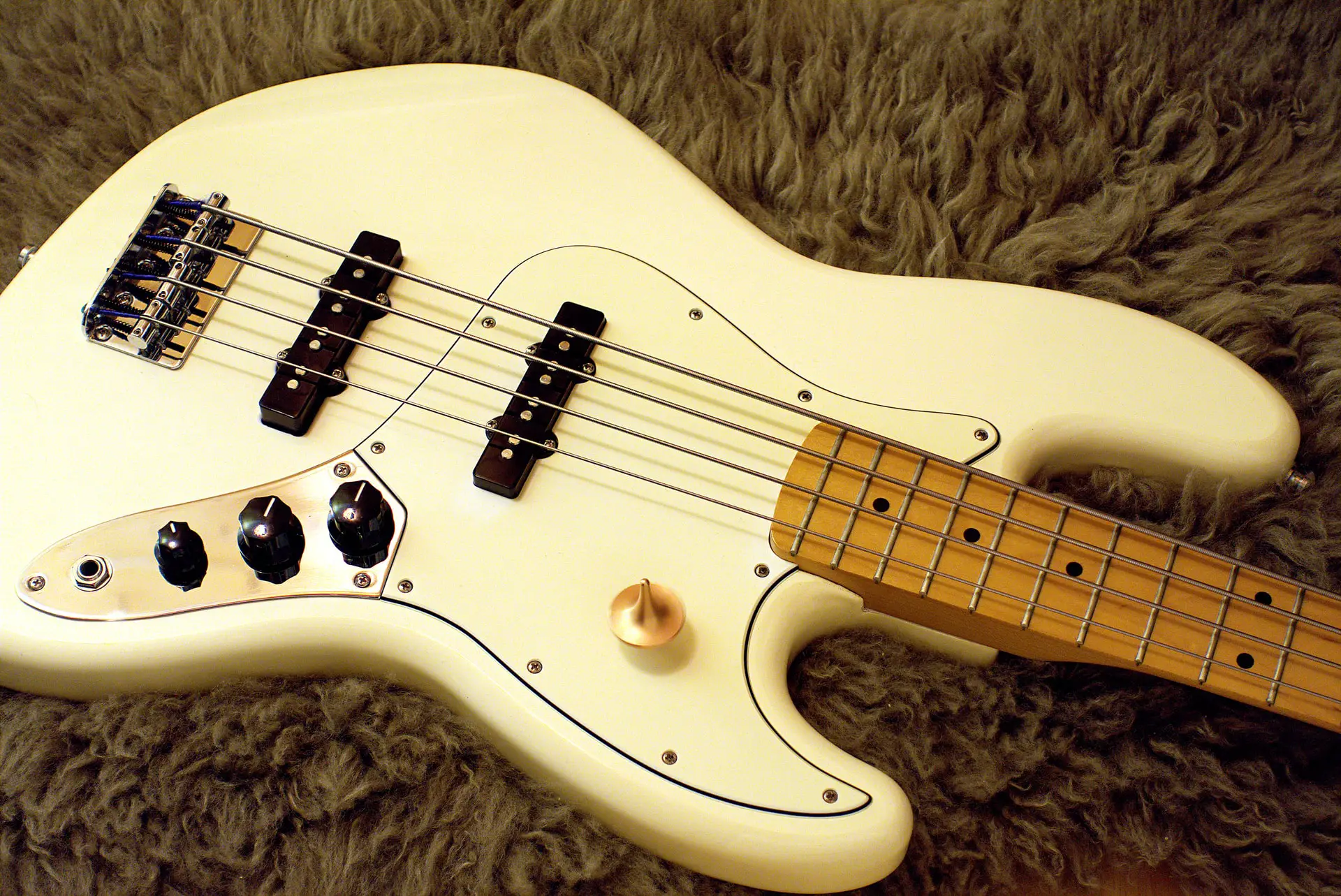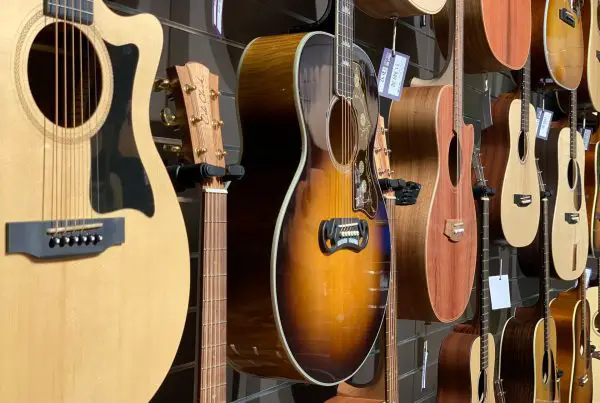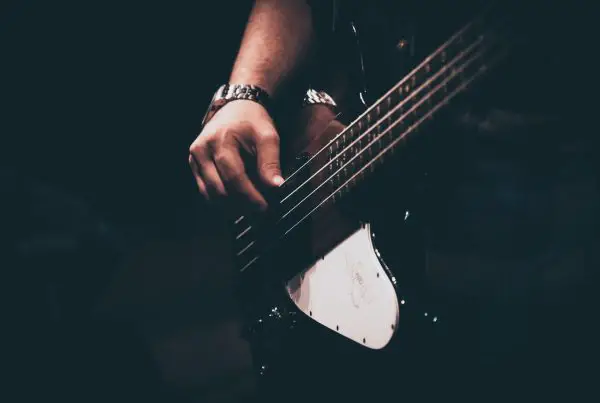Bass is so expensive because it requires more raw materials than regular guitars. Also, manufacturers raise the price because the profit coming from the bass is not as big as the profit coming from regular guitars. But you can find a cheap bass that can still be good.
The whole production process requires more materials and more time. The profit is not as big as the one coming from regular guitars because there are more regular-guitar players than bassists.
Therefore, people who want to learn how to play bass often choose cheaper ones that can still be good and pretty reliable.
My friend advised his son to buy a cheaper bass because maybe he will not find himself as a bassist over time. Also, he works at a workshop, so he said he is going to make some adjustments later.
Here is some information about expensive and cheap basses that can help you to build your opinion and say whether my friend is right or not. Also, you will get some tips on buying the first bass. Therefore, the article includes:
- Why Is Bass So Expensive?
- How Much Should You Pay For A Bass?
- How Much Should A First Bass Cost?
- Which Is More Expensive – Bass Or Guitar?
- Does A More Expensive Bass Sound Better?
- Should I Buy A Cheap Bass?
- Conclusion
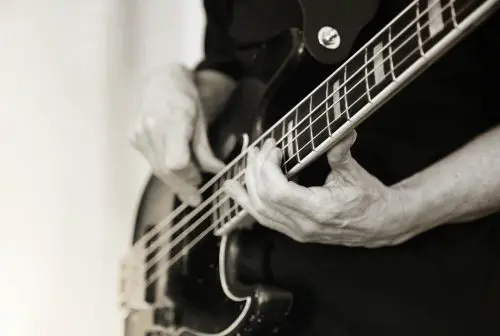
Bass is more expensive because it requires more material and manufacturer rises the profit due to lower volumes sold (compared to guitars).
Why Is Bass So Expensive?
Bass requires more raw materials, and the whole production process is more complex and takes more time.
Also, the bass is expensive due to the rule of mass production – not so many people buy basses, so the profit is not so big, and manufacturers need to raise the price to earn more money.
Therefore, you can see many factors have an impact on the price. Here are some factors explained in more detail.
Bass Strings
Bass strings are more expensive than ones for electric guitar, for example, as they require more raw material.
Bass strings require more raw material because they are thicker than regular ones. Also, bass strings are about 30% longer than those for guitars. The more material is needed, the higher price of the product is.
More windings make them harder to build and require more time as well. In an electric guitar set, you’ll get half of the strings unwound, for example, and that reflects on the price.
A typical 6-guitar-strings set weighs about 25 grams, while a 4-bass-strings set weighs 95 grams.
So, if you want to become a bassist, have on your mind that both bass and strings’ replacement will cost you a bit more.
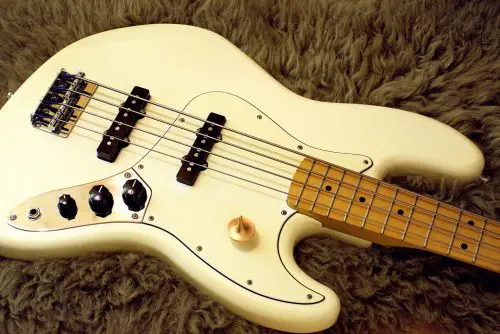
Bass strings are ticker than regular acoustic or electric guitars.
Truss Rod And Stronger Tension
Bass truss rod needs to be more solid as bass strings exert stronger tension on the bass neck than electric, acoustic, or classical guitar strings actually do.
The total tension made by electric guitar strings is around 114 lbs, and the tension made by bass strings is about 165 lbs, even there are two strings less than the electric guitar strings set.
Of course, numbers fluctuate depending on strings’ type, so you can check the total tension by using String Tension Calculator.
The truss rod helps the neck to resist the tension created by strings, so it needs to be more solid and stable to handle that force coming from bass strings.
Therefore, manufacturers need more materials, more time, and more complex work on truss rods for bass guitars.
Also, the standard scale length of the bass is bigger than the scale length of an electric guitar, for example. Therefore, you’ll need a longer truss rod for the bass, which is also another factor that has an impact on the price.
A Marketplace
It is not often for music shops to sell basses when compared to classical, acoustic, and electric guitars. So, manufacturers need to raise the price to gain more profit as they don’t sell a huge amount of their product.
Also, music shops purchase regular guitars in high shipments, and they also get a discount on a larger order.
Therefore, when music shops order a significant amount of regular guitars, the prime cost is lower. Therefore, the selling price is lower, too.
On the other side, shops can’t order that many basses as they will be on a shelf or hanger on the wall for a long period.
So, the prime cost is higher, and it’s like a chain reaction -the selling price is higher, too.
How Much Should You Pay For A Bass?
How much you should pay for a bass depends on your level of playing the bass and your budget.
I will explain this in more detail in the following text, so you can find yourself somewhere and decide how much you should pay for a bass.
Budget
If your budget is pretty tight for now, choose the bass that will not get you into trouble with money. Be rational and buy something that you really can afford.
You can find a bass under $100 that will help you learn some basics and get you into the world of the bass.
You can also get a bass under $200, such as Ibanez GSRM20. If your budget is higher, choose the one that fits you the most.
Try the instrument before buying, or ask an expert to try the bass if you are a beginner.
The Level Of Playing
Entry-level bass costs under $200, the bass for intermediate-level bass players costs around $200-$450, and the bass for an expert costs more than $500.
You don’t need an expensive bass if you’re a beginner. You’re still exploring the possibility of playing the instrument, and you just need something to learn the basics on.
Intermediate-level bass players pay more than $200 for their instruments because they are getting serious about playing, you know your music style, and you want to explore more before buying expensive gear.
Experts need the best possible instrument because they are serious musicians, they play at concerts and gigs, and they need a flawless sound for the studio.
How Much Should A First Bass Cost?
A first bass should cost between $100 and $200 as its purpose is learning the basic things and exploring the possibility of playing an instrument.
You don’t need an expensive first bass unless you really want to buy something expensive for a specific, personal reason.
You’re still exploring whether you want to continue learning and playing or not, so buying a $1000 bass and then leaving it in a room corner and touching it just while wiping the dust is not a happy end.
If you’re buying the first bass for your kid and you want them to discover music, keep in mind that kids change their interests over time.
The song is played the same on both cheap and expensive guitars, and you just need something to learn on and to see whether you still love to play the bass or not.
Don’t think your teacher knows how to play just because he owns an expensive guitar. Have this statement on your mind: it’s not about the instrument – it’s about the player.

Any $100 – $200 bass is good enough if you are a beginner. You can learn the concepts and techniques of bass on cheaper instruments. Bass in Image: Ibanez GSRM 4
Which Is More Expensive – Bass Or Guitar?
Bass is usually more expensive than guitars when it comes to both the prime and the selling price.
As I said, the overall production process of the bass requires more time, more raw materials, and more complex work.
That’s because of the bass’ strings properties, as they’re thicker and have more windings than a regular guitar does.
Remember the mentioned detail where the electric guitar strings’ set weighs 25 grams, while the one for the bass weighs 95 grams with two strings less.
Also, the bass’ truss rod needs to be more solid and stable as the bass strings exert more tension on the neck than electric, acoustic, or classical guitar strings do. Besides that, the bass’ scale length is bigger than a regular-guitar one, so manufacturers put a longer truss rod. That is also a factor that makes the price higher.
Overall, manufacturers need to pay more for materials and workers that need to do more complex work when compared to the whole regular guitars’ production process.
Of course, music shops are more likely to order more regular guitars than basses because the market is just like that. As I said, they often get a discount on bigger orders and a lower prime price, which reflects on the selling price.
Does A More Expensive Bass Sound Better?
Yes, expensive bass does sound better because of the better construction, wood, hardware, and electronics. But, it’s all up to the player.
The bass price is determined by materials’ quality, workers’ payments, and the time spent producing the instrument.
Therefore, expensive bass has high-quality materials, and the workers spend more time building the instrument.
Expensive basses usually have better construction, wood, hardware, finish, and electronics. It will give you more tonal options and more sustain.
But, if you give a cheaper bass to a good player and a bad player the most expensive bass, you’ll see how much the instrument price tag really means.
Should I Buy A Cheap Bass?
You should buy a cheap bass because the instrument price tag doesn’t mean as much as people think.
A cheap bass gives you an opportunity to learn how to play the bass and to try to find yourself as a bassist.
If your commitment and motivation start to fade, you won’t be sad because you have paid too much for something that is lonely in a room corner now. Besides that, it’s not trash – every good player will sound good while playing both the cheap and the expensive bass.
But if you’re an expert player, you already know that cheap bass is not suitable for concerts and recording at the studio.
Here are 6 tips when it comes to buying your first cheap bass:
- The size of the bass should be matched to the size of you – the bassist.
- Ask your teacher or another expert to check the bass’ tuning stability, frets’ level, guitar-neck width, action, and the condition of electronics.
- Try out several basses of the same brand before you settle on one because, in the low-price ranges, the quality is inconsistent. Ask a teacher or another expert to try them out.
- Beware of premature deterioration of entry-level bass guitars. Learn how to take care of them.
- Go to the luthier’s workshop and ask for setting the bass up, at least twice a year for better intonation and action.
- Take care of the bass’ neck and body.
Conclusion
Basses are expensive because they require more raw materials and more time for the production process that is more complex than one for regular guitars.
You can find a wide price range when it comes to basses. Expensive ones have better construction, electronics, and, therefore, sound. But, cheap ones can also sound good if the player is good.
If you want to buy a bass, I recommend you consider your budget, your commitment level, and your level of playing.
A cheap guitar is suitable for beginners as they need an instrument for learning the basics. Even after a beginner becomes an expert, a cheap guitar can sound good, but it’s not suitable for concerts or a studio.
I recommend every beginner to buy a cheaper bass because it gives the beginner everything that he/she needs.
Also, the person can soon change his/her mind when it comes to the instrument choice or hobby in general. You don’t want to spend a lot of money on something you don’t use anymore.


